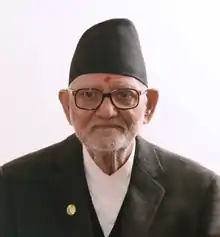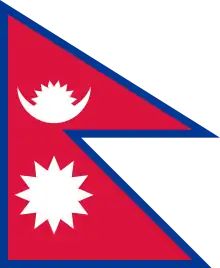Sushil Prasad Koirala | |
|---|---|
| सुशील प्रसाद कोइराला | |
 | |
| 37th Prime Minister of Nepal | |
| In office 11 February 2014 – 11 October 2015 | |
| President | Ram Baran Yadav |
| Preceded by | Khil Raj Regmi (Acting) |
| Succeeded by | Khadga Prasad Sharma Oli |
| President of the Nepali Congress | |
| In office 22 September 2010 – 9 February 2016 | |
| Preceded by | Girija Prasad Koirala |
| Succeeded by | Sher Bahadur Deuba |
| Member of the House of Representatives for Banke–2 | |
| In office 1991–1994 | |
| Preceded by | Constituency created |
| Succeeded by | Shanti SJB Rana |
| In office 1999–2008 | |
| Preceded by | Shanti SJB Rana |
| Succeeded by | Mohammad Estiyak Rai (as member of the Constituent Assembly) |
| Member of the Constituent Assembly / Legislature Parliament | |
| In office 21 January 2014 – 9 February 2016 | |
| Preceded by | Sarbadev Prasad Ojha |
| Succeeded by | Nanda Lal Roka Chhetri (as member of the House of Representatives) |
| Constituency | Banke–3 |
| Personal details | |
| Born | 12 August 1939 Biratnagar, Kingdom of Nepal |
| Died | 9 February 2016 (aged 76) Kathmandu, Nepal |
| Nationality | Nepali |
| Political party | Nepali Congress |
| Parent(s) | Bodh Prasad Koirala (father) Kumudini Koirala (mother) |
| Nickname | Sushil Da (Nepali: सुशील दा) |
Sushil Prasad Koirala (Nepali: सुशील कोइराला; 12 August 1931 – 9 February 2016) was a Nepalese politician and the Prime Minister of Nepal from 11 February 2014 to 10 October 2015.[1] He was also President of the Nepali Congress from 2010 to 2016, having earlier served under various capacities in the party.[2]
Early life
Koirala was born to Bodh Prasad and Kumudini Koirala on 12 August 1939 in Biratnagar, second-largest city of Nepal.[2] A member of the politically prominent Koirala family, he was the cousin of former prime ministers Matrika Prasad Koirala, Bishweshwar Prasad Koirala and Girija Prasad Koirala.[3]
Political career
Koirala entered politics in 1954 inspired by the social-democratic ideals of the Nepali Congress. In 1958, he keenly participated in Bhadra Abagya Aandalon (Civil Disobedience Movement) launched by the Nepali Congress. In 1959, he actively involved himself in the party's objective of carrying out the democratic elections. The election saw Bishweshwar Prasad Koirala become the first elected prime minister of the country. However, King Mahendra planned and executed a coup in December 1960 and expelled the elected government led by B.P. Koirala. This resulted in the exile of several members of the Nepali Congress to India, which included Sushil Koirala. He remained in political exile in India for 16 years following the royal takeover of 1960. Koirala also spent three years in Indian prisons for his involvement in a plane hijacking in 1973.[4] While in exile, Koirala was the editor of Tarun, the official party publication. He has been a member of the Central Working Committee of the party since 1979 and was appointed General Secretary of the party in 1996 and Vice President in 1998.
In 2001, he lost the leadership ballot for Nepali Congress' parliamentary party to former prime minister Sher Bahadur Deuba. Koirala was appointed acting president of the party in 2008 by president Girija Prasad Koirala. The 12th general convention of the Nepali Congress, on 22 September 2010, elected him party president.[4]
The Nepali Congress emerged as the largest party in the 2013 Constituent Assembly elections under Koirala's leadership. He was elected leader of the Congress' parliamentary party securing 105 out of 194 votes against former prime minister Deuba's 89 votes, and on 10 February 2014, he was nominated as prime minister by the constituent assembly.[5][6] During his tenure as prime minister, his government was criticized for its slow aid response to the April 2015 Nepal earthquake.[7] A historic agreement among the country's four major political parties was also made that year, which paved the way for the promulgation of a new constitution.[8] Due his major role, he is also known as the "Father of the Constitution" Honouring a pledge to stand down as prime minister once the new constitution came into effect, Koirala resigned on 10 October 2015.[9] He sought re-election but was defeated by KP Sharma Oli, leader of Congress' former coalition partners, the CPN (UML).[10]
Electoral history
Koirala was elected to the Pratinidhi Sabha from the Banke–2 constituency in 1991 and 1999, while he was defeated in 1994. He lost in the 2008 Constituent Assembly election from Banke–3, finishing third behind the candidates of the MJFN and the UCPN (Maoist).[11] He contested and won from both Banke–3 and Chitwan–4 in the 2013 Constituent Assembly election.[12] He later relinquished the Chitwan–4 seat and represented Banke–3 in the 2nd Constituent Assembly.[13]
Only the top two candidates are shown below.
1991 Pratinidhi Sabha Election
Banke–2[14]
| Party | Candidate | Votes | Status |
|---|---|---|---|
| Nepali Congress | Sushil Koirala | 14,409 | Elected |
| CPN (UML) | – | 5,926 | Lost |
| Result | Congress win | ||
1994 Pratinidhi Sabha Election
Banke–2[15]
| Party | Candidate | Votes | Status |
|---|---|---|---|
| RPP | Shanti Shamsher Rana | 15,711 | Elected |
| Congress | Sushil Koirala | 10,222 | Lost |
| Result | RPP gain from Congress | ||
1999 Pratinidhi Sabha Election
Banke–2[15]
| Party | Candidate | Votes | Status |
|---|---|---|---|
| Congress | Sushil Koirala | 15,256 | Elected |
| CPN (ML) | Rijwan Ahammad Sah | 6,185 | Lost |
| Result | Congress gain from RPP | ||
2008 Constituent Assembly Election
Banke–3[16]
| Party | Candidate | Votes | Status |
|---|---|---|---|
| MJF – Nepal | Sarbadev Prasad Ojha | 14,900 | Elected |
| UCPN (Maoist) | Parma Nanda Kurmi | 6,970 | Lost |
| Congress | Sushil Koirala | 5,969 | Lost |
| Result | MJFN gain from Congress | ||
2013 Constituent Assembly Elections
Banke–3
| Party | Candidate | Votes | Status |
|---|---|---|---|
| Congress | Sushil Koirala | 10,753 | Elected |
| RPP – Nepal | Dhawal Shumsher Rana | 8,809 | Lost |
| Result | Congress gain from MJFN | ||
Chitwan–4
| Party | Candidate | Votes | Status |
|---|---|---|---|
| Congress | Sushil Koirala | 20,760 | Elected |
| UCPN (Maoist) | Chitra Bahadur Shrestha | 10,739 | Lost |
| Result | Congress gain from UCPN(M) | ||
2015 Parliamentary Prime Minister Election
| Party | Candidate | Votes | Status |
|---|---|---|---|
| CPN (UML) | KP Sharma Oli | 338 | Elected |
| Congress | Sushil Koirala | 249 | Lost |
| Result | CPN (UML) gain from Congress | ||
Personal life
Koirala remained unmarried throughout his life and was known to live a simple life.[17] He was fondly known among his friends and supporters as 'Sushil daa'. Although Koirala was believed to have completed formal education with an Intermediate of Commerce (I. Comm.) degree from a college in India according to his sister-in-law, he refuted those claims and maintained to have only received informal education.
Illness and death
A heavy smoker, Koirala was diagnosed with tongue cancer in 2006 and lung cancer in June 2014.[18] He died on 10 February 2016 at 12:50 AM of pneumonia in Kathmandu, at the age of 76.[19]
Bibliography
- Koirala, Sushil (2017). Dinesh Bhattarai (ed.). Nepal's Foreign Policy: From Expediency to Pragmatism. B.P. Koirala Memorial Trust.
See also
References
- ↑ "Koirala elected new PM". The Kathmandu Post. Archived from the original on 2 March 2014. Retrieved 10 February 2016.
- 1 2 "Personal Resume". Nepali Congress. Archived from the original on 21 March 2012. Retrieved 10 February 2016.
- ↑ Parashar, Utpal (9 February 2016). "Nepali Congress looks at future without a Koirala at its helm". Hindustan Times. Retrieved 10 February 2016.
- 1 2 Bhattarai, Kamal Dev (10 February 2016). "ADIOS SUSHIL DA (1939-2016)". The Kathmandu Post. Retrieved 10 February 2016.
- ↑ "Koirala elected as NC PP leader". My Republica. Retrieved 26 January 2014.
- ↑ Ghimire, Binod (3 January 2014). "For PMship, Koirala to be PP leader first". The Kathmandu Post. Retrieved 7 January 2014.
- ↑ Subramanian, Samanth (30 April 2015). "Anger rises in Nepal over government's response to earthquake". The National. Retrieved 10 February 2016.
- ↑ Jha, Prashant (9 February 2016). "Why Sushil Koirala leaves a contested legacy in Nepal". Hindustan Times. Retrieved 10 February 2016.
- ↑ "Nepal's Koirala resigns as PM and seeks re-election". Al Jazeera. Retrieved 10 February 2016.
- ↑ "Communist party leader elected as Nepal's new prime minister". The Guardian. Retrieved 10 February 2016.
- ↑ "Ca Election report".
- ↑ "Ca Election report". Archived from the original on 2015-04-02.
- ↑ "Top leaders give up seats from Chitwan, Kailali, Kathmandu". The Kathmandu Post. 5 February 2014. Retrieved 5 February 2014.
- ↑ https://nepalresearch.org/politics/background/elections_old/election_1991_constituency_results_english.pdf
- 1 2 "Finalised Constituencies With Top Two Candidates". Archived from the original on 2008-03-05.
- ↑ "Ca Election report".
- ↑ "Sushil shifts to GPK's apartment". The Kathmandu Post. Archived from the original on 22 July 2015. Retrieved 10 February 2016.
- ↑ "Nepal PM Sushil Koirala has lung cancer". BBC News. Retrieved 10 February 2016.
- ↑ "Ex-PM Sushil Koirala passes away". My Republica. Archived from the original on 15 February 2016. Retrieved 10 February 2016.
